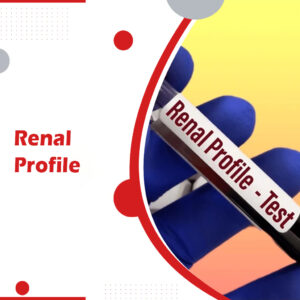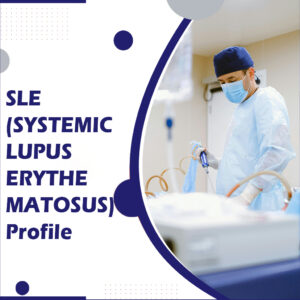Kidneys
- Filtering waste products, excess water, and other impurities out of the blood.
- Regulating pH, salt, and potassium levels in the body.
- Regulating blood pressure and the production of red blood cells.
- Activating a form of vitamin D that enhances calcium absorption.
Kidney Tests / Packages

Symptoms of Kidney Disease:

Fatigue and poor appetite due to a buildup of toxins and impurities in the blood resulting from reduced kidney function
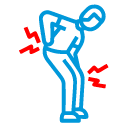
Muscle cramping, due to electrolyte imbalances resulting from impaired kidney function

Puffiness around the eyes due to the kidneys leaking a large amount of protein in the urine

Decreased mental alertness due to a buildup of toxins and impurities in the blood

Trouble sleeping, due to decreased kidney function resulting in buildup of toxins in the blood

Oedema - Swollen feet, hands and ankles, due to decreased kidney function leading to sodium retention

Frequent urination, especially late at night

Dry/Scaly skin, when the kidneys are no longer able to keep the right balance of minerals and nutrients in the blood
Severe symptoms may include:

Nausea, vomiting due to a buildup of toxins and impurities in the blood
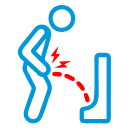
Changes in urine output

Anaemia (a decrease in red blood cells), can cause weakness and fatigue

Sudden rise in potassium levels

Loss of appetite due to a buildup of toxins and impurities in the blood resulting from reduced kidney function
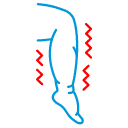
Fluid retention is common in kidney disease and manifests with swelling

Anaemia (a decrease in red blood cells), can cause weakness and fatigue
Are You at Risk of Kidney Disease?
Diabetes
Diabetes is also a major cause of chronic kidney disease. The increased level of sugar in the blood damages the blood vessels in the kidneys over time.
Hypertension
High blood pressure is dangerous for the kidneys because it can increase the pressure on the glomeruli. Glomeruli are the tiny blood vessels in the kidneys where blood is cleaned. Over time, the increased pressure damages these vessels and kidney functions begin to decline.
Age
Kidney Diseases are more common among people over 60. Senior persons should regularly monitor their kidney health.
Family history
A family history of kidney diseases is associated with an increased risk of developing similar conditions.
Atherosclerosis
Reduced blood flow to the kidney can cause scarring of the kidney. People with high cholesterol and triglyceride levels are at higher risk
Smoking
Smoking is harmful for the kidneys and can cause kidney disease to progress.
Obesity
Obesity increases the risk of developing major risk factors for chronic kidney disease, like diabetes and hypertension.
Types of Kidney Disease
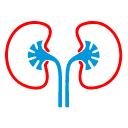
Chronic Kidney Disease
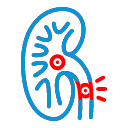
Kidney Stones
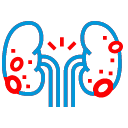
Glomerulonephritis
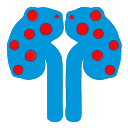
Polycystic Kidney
Disease
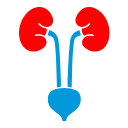
Urinary Tract Infections
Chronic Kidney Disease
- Chronic kidney disease is a condition characterised by a gradual loss of kidney function over time and is mainly caused by diabetes, high blood pressure and other disorders.
- High blood pressure is dangerous for the kidneys because it can increase the pressure on the glomeruli. Glomeruli are the tiny blood vessels in the kidneys where blood is cleaned.
- Over time, the increased pressure damages these vessels and kidney functions begin to decline.
- Diabetes is also a major cause of chronic kidney disease. The increased level of sugar in the blood damages the blood vessels in the kidneys over time.
- Early detection and treatment can often keep chronic kidney disease from getting worse. When kidney disease progresses, it may eventually lead to kidney failure, which requires dialysis or a kidney transplant to maintain life.
Kidney Stones
Kidney stones occur when minerals and other substances in the blood crystallise in the kidneys, forming solid masses (stones). Kidney stones usually come out of the body during urination.
Glomerulonephritis
Glomerulonephritis is an inflammation of the glomeruli. Glomeruli are extremely small structures inside the kidneys that filter the blood. Glomerulonephritis can be caused by infections, drugs, or congenital abnormalities.
Polycystic Kidney Disease
Polycystic kidney disease is a genetic disorder that causes numerous cysts (small sacs of fluid) to grow in the kidneys. These cysts can interfere with kidney function and cause kidney failure.
Urinary Tract Infections
Urinary tract infections (UTIs) are bacterial infections of any part of the urinary system. Infections in the bladder and urethra are the most common. If left untreated, these infections can spread to the kidneys and cause kidney failure.
How is Kidney Disease Diagnosed?
Glomerular filtration rate (GFR)
Glomerular filtration rate (GFR) is a test used to check how well the kidneys are working. Specifically, it estimates how much blood passes through the glomeruli each minute. Glomeruli are extremely small structures inside the kidneys that filter the blood.
Urine Examination
A urinalysis is a group of physical, chemical, and microscopic tests. The tests detect and measure several substances in the urine including glucose, protein, bilirubin, red blood cells, white blood cells, crystals, and bacteria.
Protein Creatinine Ratio, Urine
A urine protein test is often used to screen for, help evaluate, and monitor kidney function and to help detect and diagnose early kidney disease. Urine Protein-Creatinine ratio is a simple & convenient method to quantitate & monitor proteinuria in adults with chronic kidney disease.
Microalbumin Creatinine Ratio
This test is useful in the management of patients with early Diabetes mellitus to assist in avoiding or delaying the onset of renal disease.
Kidney Panel, KFT
A kidney panel is a group of tests that may be performed together to evaluate kidney function. The tests measure levels of various substances, including -
- Electrolytes, electrically charged chemicals that are vital to normal body processes. Electrolytes include:
- Sodium,
- Potassium,
- Chloride,
- Minerals, electrically charged chemicals that are vital to normal body processes. Electroly
- Phosphorus, vital for energy production, muscle and nerve function, and bone growth
- Calcium, essential for the proper functioning of muscles, nerves, and the heart and is required in blood clotting and the formation of bones.
- Albumin, a protein essential to keeping fluid from leaking out of blood vessels and transporting hormones, vitamins, drugs, and ions like calcium throughout the body.
- Waste products,
- Urea, a nitrogen-containing waste product that forms from the metabolism of protein
- Creatinine, produced by the body’s muscles. Almost all creatinine is eliminated by the kidneys.
- Uric, Acid, the end product of protein metabolism.
- Glucose, Supplies energy for the body
- A:G Ratio, the calculated ratio of albumin to globulins. It may provide a clue as to the cause of change in protein levels.
Creatinine Clearance Test
Creatinine clearance reflects the glomerular filtration rate, the ability of kidneys to filter waste products. A moderate decrease in renal function is detected by creatinine clearance. It also monitors the progression of renal disease.
Uric Acid
Uric acid is the end product of protein metabolism. The uric acid blood test is used to diagnose the cause of recurrent kidney stones and to monitor people with gout for stone formation.
Beta-2 Microglobulin
Beta-2 microglobulin is a protein that is found on the surface of nucleated cells and functions as part of the human immune system. The beta-2 microglobulin test may be used when known physical or suspected kidney damage occurs to distinguish between glomerular and tubular disorders of the kidney.
Vitamin D 1, 25-Dihydroxy
Vitamin D is a family of compounds that is essential for the proper growth and formation of teeth and bones. This test measures the level of vitamin D in the blood. A low level of 1,25-dihydroxy Vitamin D can be seen in kidney disease and is one of the earliest changes to occur in persons with early kidney failure.
Kidney Scans
Kidney scans may include a magnetic resonance imaging (MRI) scan, computed tomography (CT) scan, or an ultrasound scan. The aim is to determine whether there are any blockages in the urine flow. These scans can also reveal the size and shape of the kidneys.
Kidney Biopsy
A small sample of kidney tissue is extracted and examined for cell damage. An analysis of kidney tissue makes it easier to make a precise diagnosis of kidney disease.
How can Kidney Disease be Prevented?
Following measures can be taken to prevent kidney disease:
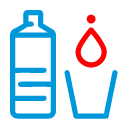
Drink plenty of water
It helps to flush out infection-causing
bacteria

Control blood sugar
The best way to prevent or slow kidney damage

Control blood pressure
High blood pressure can increase
damage to the kidneys

Reduce salt intake
Too much salt can be harmful for people with kidney disease

Drink plenty of water
It helps to flush out infection-causing
bacteria
The kidneys are a pair of bean shaped organs, and each is about the size of a fist. They are located on either side of the back, protected inside of the lower part of the rib cage. They help filter blood and remove waste from the body.
Blood flows from the renal artery into the kidneys. Each kidney contains about a million tiny units for filtration known as nephrons. They help filter waste to the urine and then return the filtered blood to the body through the renal vein.
The kidneys also produce urine when they remove waste from the blood. Urine flows out of the kidneys through the ureters, then down to the urinary bladder.
A person can live with just one kidney. When a person is experiencing severe kidney failure, dialysis can filter the blood until they get a kidney transplant or their kidney recovers some function. Some people need to undergo hemodialysis long term.
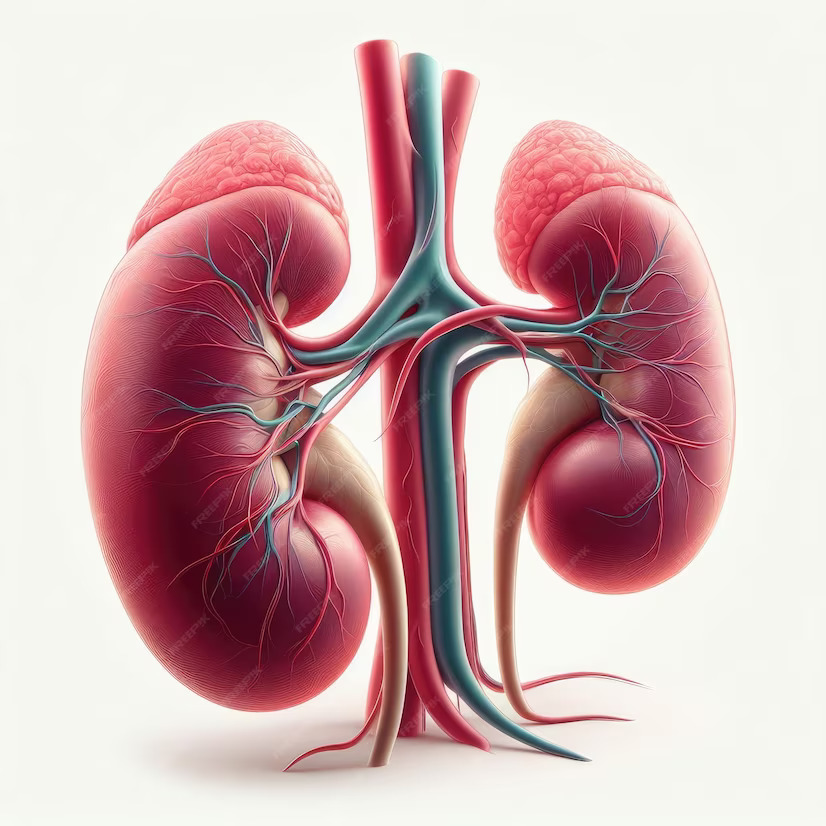
Basic Tests
Urinalysis, Complete with Microscopic Examination
A Urinalysis, Complete with Microscopic Examination is useful in the evaluation of conditions such as urinary tract infection (UTI), dehydration, and kidney stones.
Uric Acid Blood Test
An Uric Acid Blood Test is used to help diagnose the cause of recurrent kidney stones and to monitor people with gout for stone formation.
Parathyroid Hormone (PTH) Intact Blood Test
A PTH Intact Blood Test diagnoses parathyroid disease and other diseases of calcium homeostasis; monitoring patients undergoing renal dialysis.
Urine Culture Test, Routine
A Urine Culture Test, Routine detects and identifies bacteria and yeast in the urine.
Microalbumin/Creatinine Ratio Urine Test, Random
The Microalbumin/Creatinine Ratio Urine Test, Random is a urine test that may help to determine if kidneys are functioning normally. This test is an early indicator of kidney failure.
Electrolyte Blood Test Panel
The Electrolyte Panel is performed to check for kidney problems, acids in your blood, a sodium or potassium problem and diabetes.
Creatinine Serum Test
A Creatinine Serum Test is a renal function test, providing a rough approximation of glomerular filtration.
Ammonia Plasma Test
This ammonia plasma test measures the amount of Ammonia in the blood, a compound produced by intestinal bacteria, and by cells in the body during the digestion of protein.
Phosphorus Serum Test
Phosphorus testing may be performed to measure high or low levels of phosphorus to determine a variety of differential diagnoses such as: dehydration, renal disease, liver disease, diabetic ketoacidosis. Phosphate levels may increase during the last trimester of pregnancy.
Vitamin D 1,25 Dihydroxy (Calcitriol) Blood Test
A Vitamin D 1,25 Dihydroxy Blood Test is ordered when investigating a problem related to bone metabolism or parathyroid function, possible Vitamin D deficiency or malabsorption.
Microalbumin Urine Test, Random
The random microalbumin urine test checks urine for the presence of the protein albumin in the blood. In individuals whose kidneys are working properly albumin is not present. However, if the kidneys are damaged or diseased, small amounts of albumin will be present in the urine.
Calcium Ionized Serum Test
The Calcium Ionized Serum Test measures the amount of Ionized Calcium, also known as free calcium, in the blood.
Urine Culture, Comprehensive
An Urine Culture, Comprehensive is ordered if Routine Urine Culture was not diagnostic.
Protein and Creatinine Urine Test, Random
A protein and creatinine urine test, random measures the protein/creatinine ratio in a first-morning or random untimed “spot” urine specimen is recommended testing to ascertain chronic kidney disease.
Lactic Acid Dehydrogenase (LD) Blood Test
A LD or LDH Blood Test measures lactic acid dehydrogenase an enzyme that is elevated in case of any tissue damage or injury.
Complement C4 Blood Test
This Complement C4 Blood Test measures the amount of Complement C4 protein in your blood. These proteins are part of your complement system, an important part of your immune system that helps kill bacteria and viruses causing disease.
Complement C3 Blood Test
A Complement C3 Blood Test is used to determine whether deficiencies or abnormalities in the proteins that are part of the complement system are contributing to increased infections or increased autoimmune activity; and to monitor the activity of autoimmune diseases.
Aldosterone Blood Test, LC-MS
The aldosterone blood test is used to evaluate patients with hypertension and for the possibility of hyperaldosteronism.
Cortisol Urine Test, Urinary Free, 24-Hour
A Cortisol Urine Test, Urinary Free is used in the diagnosis of Cushing syndrome (CS) requires evidence of cortisol hypersecretion. While serum cortisol levels fluctuate unpredictably and are strongly dependent on concurrent cortisol-binding globulin (CBG) levels, a 24-hour urine specimen integrates the cortisol production for an entire day and is not affected by CBG. Urinary cortisol reflects the portion of serum-free cortisol filtered by the kidney, and correlates well with cortisol secretion rate.
Protein Electrophoresis Serum Test
A Protein Electrophoresis Serum Test measures the types of protein in the fluid (serum) part of a blood sample.
Calcium Urine Test, 24-Hour
A Calcium Urine Test, 24-Hour measures the level of calcium in your urine.
Protein Total Urine Test, Quantitative, 24-Hour
Used to evaluate and monitor kidney function, and to detect kidney damage.
Beta 2 Microglobulin Serum Test
A beta 2 microglobulin serum test evaluates the severity and prognosis of multiple myeloma, chronic lymphocytic leukemia, or non-Hodgkin’s lymphoma; detects kidney damage and distinguishes between glomerular and tubular kidney disorders.
Alkaline Phosphatase Blood Test
The alkaline phosphatase blood test measures the level of the enzyme alkaline phosphatase in the blood.
Urea Nitrogen (BUN) Serum Test
A Urea Nitrogen (BUN) Serum Test is used to measure the amount of urea in the blood.
Cystatin C Blood Test
A Cystatin C Blood Test is used to screen for and monitor kidney dysfunction in those with known or suspected kidney disease.
Albumin Serum Test
Albumin blood test evaluates nutritional status, blood oncotic pressure, evaluation of renal disease with proteinuria, and other chronic diseases.
Erythropoietin (EPO) Serum Test
An EPO Test is a blood disorder serum test used to determine erythropoietin level, an important hormone produced by the kidneys that is critical for the formation of red blood cells by the bone marrow.
Antidiuretic Hormone (ADH) Profile Blood Test
An ADH Profile Blood Test includes both ADH and osmolalityADH helps regulate water balance in the body by controlling the amount of water the kidneys reabsorb. The kidneys react to ADH by conserving water and producing urine that is more concentrated.
Complement Total (CH50) Blood Test
A CH50 test is used to help determine any protein abnormalities and deficiencies in the complement system.
Gastrin Blood Test
The Gastrin Blood Test is used to detect an overproduction of gastrin, to help diagnose Zollinger-Ellison syndrome and G-cell hyperplasia, and to monitor for recurrence of a gastrin-producing tumor (gastrinoma).
Creatinine Clearance 24-Hour Urine and Blood Test
A Creatinine Clearance 24-Hour Urine and Blood Test is used to evaluate the rate and efficiency of kidney filtration.
Antineutrophil Cytoplasmic Antibodies (ANCA) Blood T…
The ANCA Blood Test is used to detect Antineutrophil cytoplasmic autoantibodies which (ANCA) are a serological marker associated with vasculitis and glomerulonephritis.
Prealbumin Blood Test
This Prealbumin Blood Test evaluates protein malnutrition, total parenteral nutrition, and liver dysfunction.
Porphyrins Urine Test, Quantitative, Random
The Porphyrins Urine Test is the initial test for Porphyrias.
Oxalate Urine Test, Quantitative, 24-Hour
That Oxalate Urine Test looks for the presence of certain toxic substances in the intestinal tract.
Renin Activity Plasma Test
A Plasma Renin helps determine the cause of hypertension in cases where signs of kidney disease are present.
Microalbumin Urine Test, 24-Hour
A Microalbumin Urine Test is used to check urine for the presence albumin, which is normally found in the blood and filtered by the kidneys.
Aldosterone:Renin Ratio Blood Test
Aldosterone-renin activity ratio blood test measures the levels of the hormones aldosterone and renin in your blood.
Protein Electrophoresis Urine Test, Random
A Protein Electrophoresis Urine Test is a graph with quantitation of total urine protein, urine albumin, urine N1, urine N2, urine N3-globulin fractions if present; quantitation (in %) of M-spike if present.
Sodium Urine Test, 24-Hour
A 24-hour Sodium Urine Test is used in determining the cause of a sodium imbalance and for patients with kidney conditions to determine the cause of damage.
Porphyrins Urine Test, Quantitative, 24-Hour
A Porphyrins Urine Test, Quantitative, 24-Hour is used as follow up if Porphyrins, Quantitative Random Urine comes back abnormal.
Chromatin (Nucleosomal) Antibody Blood Test
The Chromatin (Nucleosomal) Antibody Blood Test is useful in diagnosing SLE (systemic lupus erythmatosis).
Creatinine Urine Test, Random
A Creatinine Urine Test, Random is useful in monitoring kidney function.
Sodium Urine Test, Random
A Sodium Urine Test Random Sodium Urine Test is a work-up volume depletion, acute renal failure, acute oliguria, and differential diagnosis of hyponatremia.
Fluoride Blood Test
The fluoride blood test is typically ordered when someone is experiencing symptoms of fluoride exposure especially if they have had contact with chemicals containing fluoride or work in an industry where airborne exposure to fluoride is common.
Urea Nitrogen Urine Test, 24-Hour
A Urea Nitrogen Urine Testis a Renal function test; coarse nitrogen-wasting test on patients on hyperalimentation; indicate nitrogen balance in hyperalimentation; rule out tap of urinary bladder in amniocentesis, paracentesis.
Protein Total Urine Test, 24-Hour with Creatinine
A Protein Total Urine Test, 24-Hour with Creatinine is used to evaluate and monitor kidney function, and to detect kidney damage.
Magnesium Urine Test, 24-Hour
The Magnesium Urine Test measures the amount of magnesium (an electrolyte) in urine collected over 24 hours. This test is used to evaluate and manage electrolyte problems in the body.
Pyruvic Acid Blood Test
A Pyruvic Acid Blood Test is used to measure the amount of pyruvate in the blood.
Osmolality Urine Test
An Osmolality Urine Test is useful in monitoring the level of water in the body and to check the ability to produce urine.
PTH Antibody Blood Test
This PTH Antibody Blood Test is used to help evaluate autoimmune disorders involving parathyroid gland that may result in the production of anti-PTH & hypo-parathyroidism.
Amino Acids 24-Hour Urine – Doctor’s Data Test Kit
The amino acid (AA) 24-hour urine aids in the identification of dietary protein adequacy and amino acid balance, gastrointestinal dysfunctions, forms of protein intolerance, vitamin and mineral deficiencies, renal and hepatic dysfunction, psychiatric abnormalities, susceptibility to inflammatory response and oxidative stress, reduced detoxification capacity and many other inherent and acquired disorders in AA metabolism



